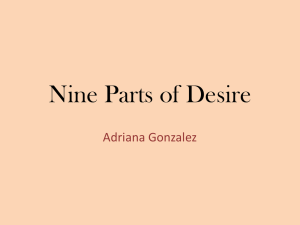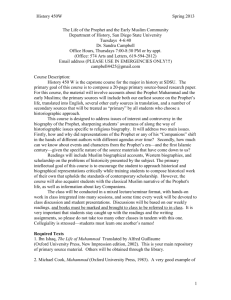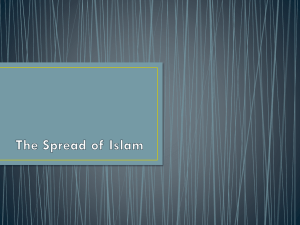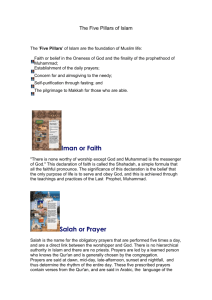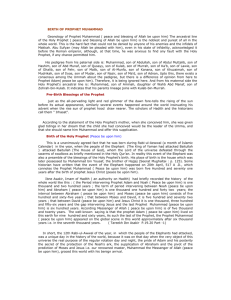Islam and Music - Education Scotland
advertisement
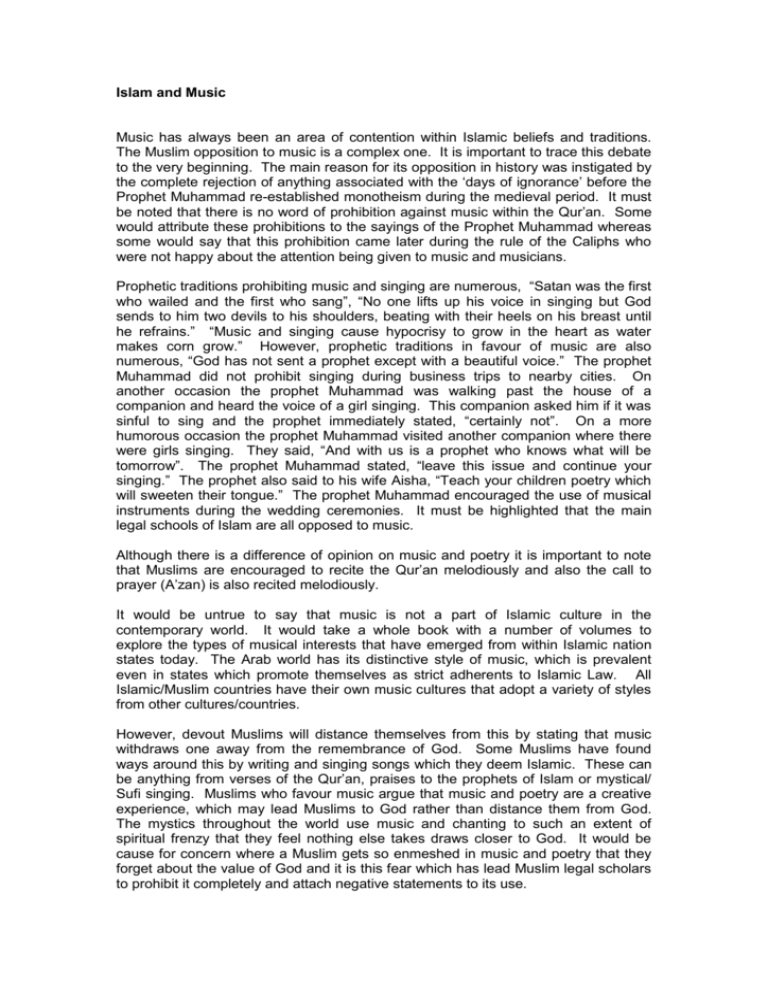
Islam and Music Music has always been an area of contention within Islamic beliefs and traditions. The Muslim opposition to music is a complex one. It is important to trace this debate to the very beginning. The main reason for its opposition in history was instigated by the complete rejection of anything associated with the ‘days of ignorance’ before the Prophet Muhammad re-established monotheism during the medieval period. It must be noted that there is no word of prohibition against music within the Qur’an. Some would attribute these prohibitions to the sayings of the Prophet Muhammad whereas some would say that this prohibition came later during the rule of the Caliphs who were not happy about the attention being given to music and musicians. Prophetic traditions prohibiting music and singing are numerous, “Satan was the first who wailed and the first who sang”, “No one lifts up his voice in singing but God sends to him two devils to his shoulders, beating with their heels on his breast until he refrains.” “Music and singing cause hypocrisy to grow in the heart as water makes corn grow.” However, prophetic traditions in favour of music are also numerous, “God has not sent a prophet except with a beautiful voice.” The prophet Muhammad did not prohibit singing during business trips to nearby cities. On another occasion the prophet Muhammad was walking past the house of a companion and heard the voice of a girl singing. This companion asked him if it was sinful to sing and the prophet immediately stated, “certainly not”. On a more humorous occasion the prophet Muhammad visited another companion where there were girls singing. They said, “And with us is a prophet who knows what will be tomorrow”. The prophet Muhammad stated, “leave this issue and continue your singing.” The prophet also said to his wife Aisha, “Teach your children poetry which will sweeten their tongue.” The prophet Muhammad encouraged the use of musical instruments during the wedding ceremonies. It must be highlighted that the main legal schools of Islam are all opposed to music. Although there is a difference of opinion on music and poetry it is important to note that Muslims are encouraged to recite the Qur’an melodiously and also the call to prayer (A’zan) is also recited melodiously. It would be untrue to say that music is not a part of Islamic culture in the contemporary world. It would take a whole book with a number of volumes to explore the types of musical interests that have emerged from within Islamic nation states today. The Arab world has its distinctive style of music, which is prevalent even in states which promote themselves as strict adherents to Islamic Law. All Islamic/Muslim countries have their own music cultures that adopt a variety of styles from other cultures/countries. However, devout Muslims will distance themselves from this by stating that music withdraws one away from the remembrance of God. Some Muslims have found ways around this by writing and singing songs which they deem Islamic. These can be anything from verses of the Qur’an, praises to the prophets of Islam or mystical/ Sufi singing. Muslims who favour music argue that music and poetry are a creative experience, which may lead Muslims to God rather than distance them from God. The mystics throughout the world use music and chanting to such an extent of spiritual frenzy that they feel nothing else takes draws closer to God. It would be cause for concern where a Muslim gets so enmeshed in music and poetry that they forget about the value of God and it is this fear which has lead Muslim legal scholars to prohibit it completely and attach negative statements to its use. The words of some famous Muslim mystics conclude the tension between Islam and music rather beautifully. Dhul Nun, a medieval Egyptian mystic who lived around 859AD sums up this tension by stating; “Listening is a divine influence which stirs the heart to see God; those who listen to it spiritually attain to God, and those who listen to it sensually fall into heresy”. Al-Shibli, another mystic, states, “Listening to music is outwardly a temptation and inwardly an admonition.” Abu’l Husain al-Darraj proudly stated, “Listening causes me to find the existence of the truth beside the hidden.” Amanullah De Sondy Centre for the Study of Islam Department of Theology and Religious Studies University of Glasgow




